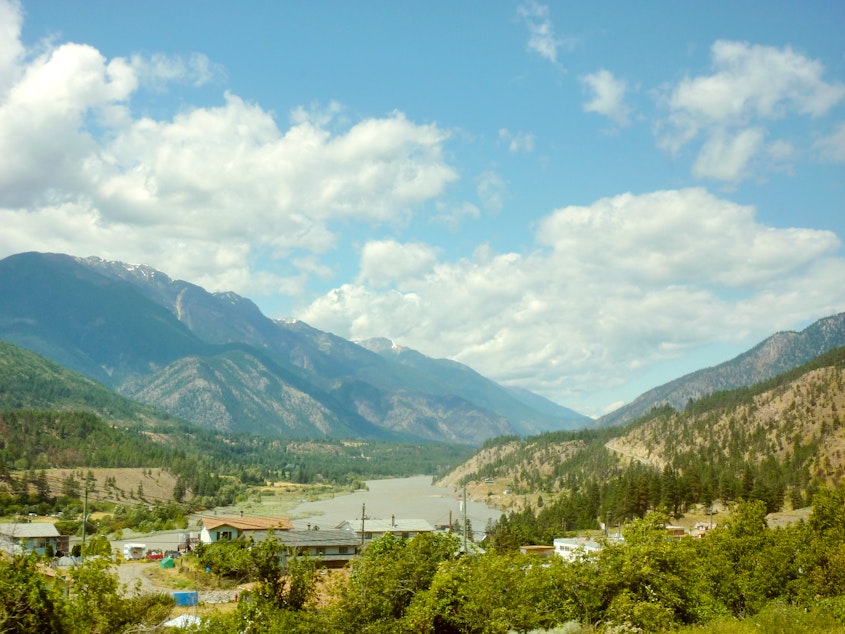Extreme heat flattens town, hits ailing salmon that orcas rely on

Extreme heat has sparked forest fires throughout central British Columbia, the region that broke Canada’s all-time temperature record three days in a row: 116, then 118, then, on Tuesday, 121 degrees Fahrenheit.
A day after setting that 121-degree record, the small town of Lytton, B.C., evacuated Wednesday evening to escape rapidly encroaching forest fires. By Thursday, the town had mostly burned to the ground: 90% destroyed, according to the area’s Member of Parliament, Brad Vis.
"The town burnt down," Lytton Mayor Jan Polderman told the CBC.
Sponsored
Satellite images showed smoke from those fires heading away from Washington, but the Puget Sound Clean Air Agency forecasts that some smoke could reach the Puget Sound region, probably staying high overhead, by Friday afternoon.
Heat waves hit NW salmon
Lytton is about 100 miles north of the U.S. border and North Cascades National Park. The town sits at the confluence of two of Canada’s most important salmon rivers: the Thompson and the Fraser.
Chinook salmon returning to the Fraser River are the main reason that fish-eating orcas spend time around Washington’s San Juan Islands.
Until recently, the Fraser River produced more Chinook salmon than all the rivers of Puget Sound combined.
Simon Fraser University ecologist Jon Moore says warm water in the Canadian rivers — with some Fraser tributaries reaching 70 degrees Fahrenheit during the heat wave — is bad news for salmon there.
“Warmer water holds less oxygen, so it’ll have health challenges for the fish,” Moore said.
Sponsored
Bad news for Fraser salmon is bad news for the endangered, fish-eating orcas that divide their time between Canada and the United States.
The endangered orcas went missing from Washington waters for nearly three months this spring, the third year in a row they abandoned their usual springtime habitat.
A lack of Chinook salmon headed for the Fraser River, especially the big, fat spring-run Chinooks that swim far upriver this time of year, is believed to be the main cause of the orcas' springtime absences.
RELATED: Endangered orcas missing from their home waters for 10 weeks
Monika Wieland Shields with the Orca Behavior Institute reported seeing members of K pod, one of the "southern resident" orcas' three pods, on July 1 off the San Juan Islands, after a three month absence.
"The crashing of the spring Chinook runs on the Fraser has led to April, May, and June going from the months of the greatest presence of the Southern Residents to the least likely time of year to see them, a shift that has occurred rapidly in just the last decade," she posted on Facebook.
With heat-wave river temperatures approaching the 70s, “Chinook populations might be delaying their migration or holding out in little cold water refuges to avoid traveling in hot waters,” Moore said.
“The spring-run Chinook are coming in early and trying to get upstream before the water gets too hot,” he said. “I think they’re really going to be challenged by climate change.”
Sponsored
Many of the juvenile spring Chinooks in the Fraser spend up to a year in fresh water before heading out to sea.
“They’ll really be affected by hot temperatures or low flows,” Moore said.

Biologist Misty MacDuffee with the Vancouver Island-based Raincoast Conservation Foundation called the situation in the Fraser River grim, even before the heat wave.
Sponsored
“There used to be salmon (Chinook and sockeye) in the tens of thousands moving through this area weekly, and the daily counts are now single and double digit numbers,” she said in an email.
Just upriver of Lytton is the Big Bar Landslide, which sent the rock equivalent of a 33-story apartment building crashing into the Fraser in 2018, making upstream passage difficult or impossible for salmon returning to their spawning grounds. In response, provincial, federal, and First Nations crews have constructed a fish passageway at the remote site and even trucked and airlifted salmon around the constriction.
All workers at the landslide site were evacuated Thursday to escape oncoming fires. Fisheries and Oceans Canada said that all salmon transport operations have been suspended and some of the site's heavy equipment would be redeployed to help fight fires.
Two days earlier, the Canadian government said it would close most commercial fisheries in the province to protect salmon stocks on “the verge of collapse” from the landslide, climate change, habitat loss, and fishing pressure.




